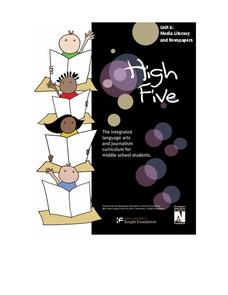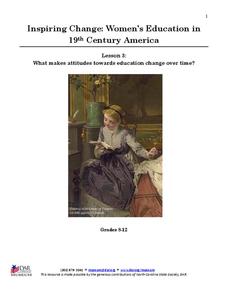Social Media Toolbox
Reporting with Social Media
What does it take to create news stories that are both informative and objective? Aspiring journalists walk the line between engagement and activism with lesson 15 of a 16-part series titled The Social Media Toolbox. Grouped pupils...
Social Media Toolbox
Verification
When you're putting together a great story, you've got to consider the source! Scholars discover the dangers of errors in reporting during the 14th activity in a 16-part Social Media Toolbox series. Groups collaborate to create a source...
Social Media Toolbox
Social Media Messages
What are the elements of a good social media post? The 13th activity in the 16-part Social Media Toolbox incorporates all of the typical components found in a Facebook or Twitter post. Scholars work together to create great posts based...
Social Media Toolbox
Twitter Time
Tweet all about it! Junior journalists explore the Twittersphere to determine its effectiveness as a news broadcasting tool in the 12th installment of the 16-part Social Media Toolbox. Participants follow and record their observations of...
Social Media Toolbox
About Facebook
If everyone is on Facebook, should the school's news publication be as well? Scholars study a social media giant in the 11th lesson from The Social Media Toolbox's 16-part series. The activity combines individual study and collaboration...
Social Media Toolbox
Cyberbullying
What can we do to make our school community more aware of cyberbullying? From The Social Media Toolbox, lesson 10 of 16 takes on the tough topic of bullying. Learners research cyberbullying through online research, then create an...
Social Media Toolbox
Social Media Roles
Social media has changed the news publishing process, so how does it affect school news publications? Lesson nine in a 16-part series titled The Social Media Toolbox explores the traditional publishing roles through the lens of social...
Social Media Toolbox
A Look at Social Media Policies
Should school news publications use social media if their district is against the use of social media in school? Pupils ponder the policy, then examine their publication's plan in parts seven and eight of a 16-part Social Media Toolbox...
Social Media Toolbox
Law Review
How can your journalism class ensure they use social media responsibly and legally? The sixth lesson in a 16-part Social Media Toolbox series asks pupils to dig deep into the legal aspects of social media use by school publications....
Social Media Toolbox
Social Media Usage
Is there a difference in the way organizations present news via social media and in print? The third in a series of 16 lessons from The Social Media Toolbox explores news outlets and their delivery methods. Groups follow a story for a...
Social Media Toolbox
Why Social Media?
Is social media the best way to convey news in your school? Young journalists dig deep into the social media question in the second of 16 lessons from The Social Media Toolbox. After learning about the relationship between social media...
Social Media Toolbox
Ethical Decision Making
When faced with a dilemma, how do journalists decide how much news to use? Social media scholars explore the philosophies of ethical resolution in the first of a 16-part Social Media Toolbox series. Partnered pupils use a Potter Box to...
American Press Institute
High Five: Media Literacy and Newspapers
Teach the five different types of media with the first of three in a media literacy unit. Learners create and propose a final newspaper project, which must address information covered throughout the unit.
American Press Institute
High Five: Go to Press
High school scholars learn valuable information about how to run a newspaper in the third and final installment of a media literacy series. The unit scaffolds learners to success with background information before they plan for...
PBS
Racial Equality: How Far Have We Come and How Far Do We Have To Go?
Is everyone treated fairly in America? The culminating fifth lesson from a series of five has pupils explore racial inequalities from the 1960s and decide whether or not society has changed over time. The lesson comes with a speech from...
National Society Daughters of the American Revolution
Lesson 3: What Makes Attitudes Towards Education Change over Time?
The struggle for women's rights is not unique to this generation, or even to the 20th century. Class members explore the conflicting opinions of Alexander Graham Bell and his wife, Mabel Hubbard Bell, regarding women's pursuits of higher...
Daughters of the American Revolution
Lesson 2: How Do We Determine the Value of Education?
Have women always had the same educational opportunities as their male counterparts? Young historians read an 1819 essay by Emma Willard on the state of female education in the 19th century before discussing their views regarding women's...
Daughters of the American Revolution
Lesson 1: How Do Society’s Expectations Influence Education?
The history of women's education can be traced back to the delicate stitching of student samplers from the 19th century. Modern-day pupils examine and analyze four primary sources, three of which are images of embroidered samplers, which...
J. Paul Getty Trust
Looking and Learning in the Art Museum — Lesson 2
Is there a difference between examining an original work of art and viewing a reproduction? Class members are asked to reflect on this question after researching a piece, study a reproduction of it, and the examining the original in an...
J. Paul Getty Trust
Looking and Learning in the Art Museum — Lesson 3
Curator, artist, art handler, archivist, conservator-restorer, guide. Who would have thought there were so many different kinds of museum professionals? After a visit to an art museum, class members reflect on the role of the museum in...
National Library of Medicine
Your Environment, Your Health: The Great Debate—Bottled Water vs. Tap Water in Our School
Should bottled water be sold in schools, or should they only provide tap water? The summative unit in the six-part series encourages scholars debating this topic. The lessons teach how to build an argument, how to gain background...
J. Paul Getty Trust
Picturing a Story: Photo Essay about a Community, Event or Issue
Picture this. Class members follow in the footsteps of W. Eugene Smith, Dorothea Lange, James Nachtwey, and Lewis Hine by creating their own photo essay about a local event or issue.
Towson University
Mystery Tubes
How do scientists know they're right? Truth be told, they don't always know. Explore the scientific process using mystery tubes in an insightful activity. Young scientists discover how to approach and solve problems in science, how ideas...
Polar Trec
Science in Antarctica
PolarTREC brings polar researchers and educators together to benefit both science and education. Pupils select one research project in Antarctica to explore and present to their peers. Scholars polish research and presentation skills as...

























